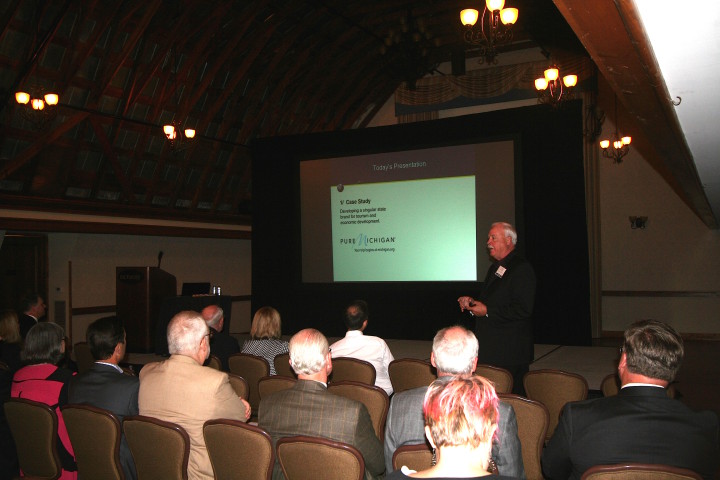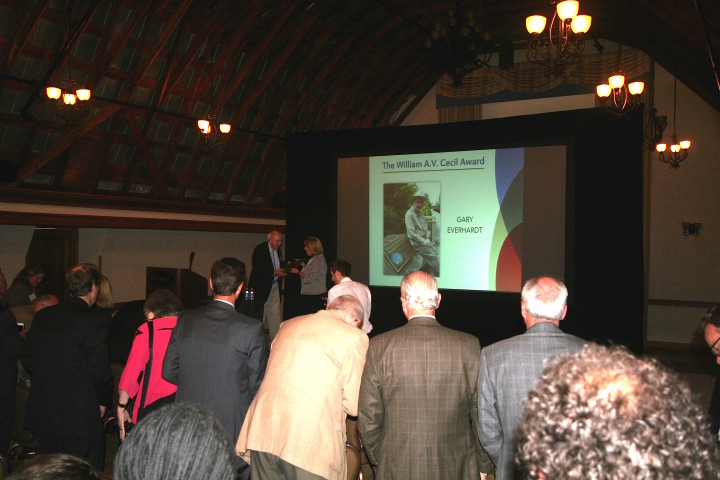Business leaders, nonprofit representatives, elected officials and political candidates from across Buncombe County gathered at the Biltmore Estate’s Lioncrest venue Wednesday, Oct. 28 for the Buncombe County Tourism Development Authority’s annual meeting. The event was billed as an opportunity to review the agency’s accomplishments over the past year.
The meeting came on the heels of a vote earlier that same day by TDA officials to break off from the Asheville Area Chamber of Commerce and operate as an independent entity.
“This is a natural evolution,” TDA chairperson and Biltmore Vice President of Sales Paula Wilber said of the decision to split from the CoC as she opened the meeting, adding that the authority will continue to work closely with the Chamber to support local businesses and develop marketing strategies geared towards attracting visitors to the area.
Wilber also provided a brief update on the TDA’s accomplishments to date, noting that the organization now represents more than 1,200 local tourism-related businesses.
“Just a few years ago, many local businesses used to close or cut back hours during the offseason,” she noted. Since then, Asheville has become a year-round destination pulling in $2.6 billion annually in economic impact from visitor spending. “Tourism is a big part of that.”
In addition, visitors to Buncombe County generated over $143 million in state and local taxes, and helped support 24,856 jobs in the area, according to TDA statistics.
Wilber went on to highlight the TDA’s expansion into 15 new advertising markets in the past year, including Florida and Washington, D.C., as well as its work with the Asheville Regional Airport and Allegiant Airlines to establish new routes to the region.
Breaking down the numbers
TDA executive director Stephanie Pace Brown spoke next, providing more details on the past year’s work. Brown noted that tax revenues from lodging went up 17.6 percent in the past year, an “all-time high water mark” for the Asheville area.
“We now have a year-round base of customers,” Brown said, adding that, while hotel room rentals still account for the majority of visitor lodging, short-term rental giant AirBnB had reported 98,500 guests in Buncombe County over the past year, 67 percent of whom had rented a whole home for their stay.
With a larger budget made possible by a recent 1.5 percent increase in the hotel occupancy tax, Brown said that the TDA had implemented a $6 million advertising plan which included broadcast, print and digital media spots in 455 markets, as well as full-page ads in four leading national publications.
In addition, Brown highlighted the redesigned exploreasheville.com website, which launched earlier this month, and outlined a new initiative to promote Asheville’s music scene.
Using the template of the successful “Foodtopia” campaign of past years, Brown said that the TDA developed a comprehensive new music website which features upcoming events, streaming music videos, artist profiles and the newly created ExploreAsheville Radio online channel, which features local artists. The website, she added, generated 150,000 page views during its three-month soft opening.
Brown also highlighted advances in attracting group business to the Asheville area, noting that in the past year, TDA staff had initiated 9,869 direct client contacts and formed sponsorship agreements with national organizations such as the American Society of Association Executives, Professional Convention Management Association and Destination Marketing Association International, among others.
Those efforts led to bookings of 392 meetings and groups and 64,965 room nights, and generated an estimated $14 million dollars in revenue for the area. “We’re no longer that table between Charlotte and Raleigh at these conventions,” Brown noted.
Lastly, Brown spoke on the impact of the TDA’s Tourism Product Development Fund, which in 2015 provided $3.9 million to six projects: the Asheville Collider, The Asheville Museum of Science, The North Carolina Glass Center, the WNC Nature Center and the city’s riverfront redevelopment and greenway network projects.
Magellan Strategy Group’s Chris Cavanuagh delivered the keynote introduction, noting, “Tourism provides direct and indirect benefits for the community,” including tax revenue, job creation and year-round support for small businesses.
More than that, “the CVB are flag bearers for our community,” he added, “and help shape national and international perceptions of who we are.”

Tourism pays off
Cavanuagh then introduced the event’s keynote speaker, George Zimmermann. The chairman of Longwoods International USA Inc., Zimmermann led Michigan’s successful Pure Michigan tourism marketing campaign from 2006 to 2014, which Forbes ranked as one of the top ten tourism promotion campaigns worldwide.
“Pure Michigan’s [success] was not a straight line by any means,” Zimmermann noted in the opening statements of his presentation,“Tourism Promotion: An Economic Engine.” He went on to highlight what he identified as the four keys to success of that campaign: A powerful, recognizable and unified brand; reliable, consistent return on investment data which was presented to elected officials and industry partners; the support of the business community; and a sufficient, consistent budget to promote and expand the brand.
“In 2005, Michigan was 50th in in the country in hotel occupancy,” Zimmermann revealed. “We were irrelevant.” However, this ignominious ranking was a blessing in disguise, he continued. “[Being] 50th is a rallying cry,” he said, and it inspired industries and governments across the state to begin working together to promote Michigan through powerful, moving imagery,expanding its reach from traditional regional markets to the national stage.
By taking the Pure Michigan campaign to the national market in 2009, Zimmermann said, the state reached a larger audience in a more cost-effective way than trying to purchase spots in individual markets. “Visitors from more distant markets tend to stay longer and spend more, especially if they drive,” he noted.
Zimmermann noted that marketing campaigns must transcend political divisions and achieve longevity, noting that Pure Michigan, which was instituted under Democratic state leadership, continued and expanded when Republican Gov. Rick Snyder took office in 2010.
[The Snyder administration] also recognized the importance of having one, unified brand,” Zimmermann said, noting that economic development initiatives and tourism outreach must work together on promoting a destination by pooling resources, rather than operating under separate campaigns.
Sponsorship opportunities with sporting events and local and national industries also helped to expand Pure Michigan’s reach, he said, and allowed local industries to use the brand as a symbol to market their own products.
“The lesson learned from that campaign,” Zimmermann said, “was that if a campaign works, keep it.”
Despite the success of Pure Michigan, Zimmermann asserted that tourism initiatives there and across the country are still underfunded and undervalued. “We’re leaving money on the table,” he said, noting that a recent ranking of the 200 top advertising campaigns in the United States did not include a single destination campaign.
Marketing a destination has become increasingly important in the modern day, Zimmermann noted, as “millenials especially want to go somewhere, and then find a job.” Destinations that defunded or severely reduced their tourism marketing budgets, such as Colorado in the 1990s and, more recently, Pennsylvania, saw sharp decreases in visitors to those states and a steady loss of revenue generated by tourism.
“They’re not maximizing their opportunity,” Zimmermann said. “Destinations that don’t market themselves consistently lose market shares. The message there is don’t let up. Don’t take your funding for granted — prove your results and market every day.”

Former Blue Ridge Parkway superintendent recognized
Following Zimmermann’s presentation, the TDA Vice President of Marketing Marla Tambellini presented this year’s William A.V. Cecil award to former National Park Service director and Blue Ridge Parkway superintendent Gary Everhardt for his longtime work in developing the Blue Ridge Parkway and bringing a whole new wave of visitors to WNC.
Everhardt was responsible to the completion of the final segment of the Parkway and oversaw the construction of the Linn Cove Viaduct, as well as the development of the Folk Arts Center and Blue Ridge Parkway Visitor Center.
In his acceptance speech, Everhardt said it was “great to see the things we talked about years ago coming [to fruition] here.”
He added that receiving this award during the National Park Service’s centennial celebration made the honor that much more special, and likened the work of the TDA to that of the Park Service. “We do similar things — we greet visitors and inform them on what this region has to offer,” Everhardt said. “We are brothers and sisters alike.”
Brown returned to the podium to close the meeting. “George Zimmermann was one of my first bosses,” Brown said. “I remember his advice to me early on — ‘If it doesn’t move the needle, don’t do it.’”
Following the official presentation, attendees gathered for food and beverages on the historic Lioncrest Veranda.
Community festivals share the wealth
The TDA also announced yesterday that it had approved $50,500 in grants to support 14 community festivals and events in the Asheville area through its newly created Cultural Events Support Fund.
Grant recipients for this year include the Asheville Downtown Association’s Independence Day Celebration, Asheville Barnaroo, the Blue Ridge Pride Festival, ASAP’s Farm Tour program, the 70th Annual Craft Fair of the Southern Highlands, LEAF Downtown and the Goombay Festival.




Before you comment
The comments section is here to provide a platform for civil dialogue on the issues we face together as a local community. Xpress is committed to offering this platform for all voices, but when the tone of the discussion gets nasty or strays off topic, we believe many people choose not to participate. Xpress editors are determined to moderate comments to ensure a constructive interchange is maintained. All comments judged not to be in keeping with the spirit of civil discourse will be removed and repeat violators will be banned. See here for our terms of service. Thank you for being part of this effort to promote respectful discussion.